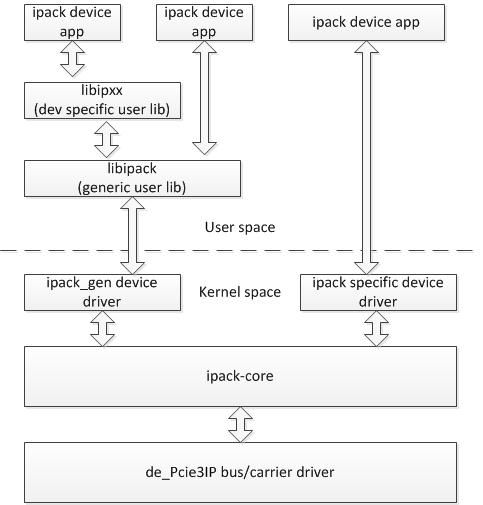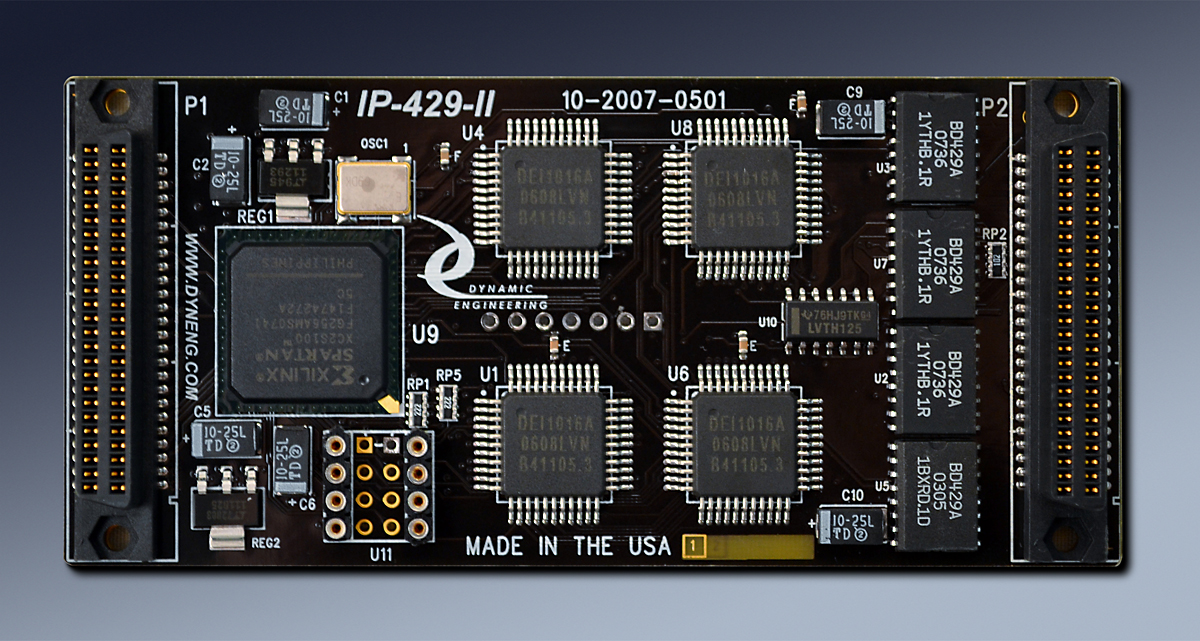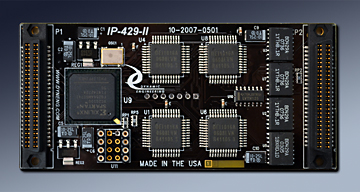IP-429
IP Module with up to 4 Transmit and 8 Receive 429 ports.
Order This Item
IP-429 Description
- Windows® driver included with purchase
- 8/32 MHz operation ↣ can be installed in any IP slot.
- Standard Type II module
- 8↔32 MHz. operation
- 1-4 transmitters, 2-8 receivers per IP-429
- LW aligned 429 transmit/receive data registers to optimize with 32 bit carriers
- Time Tag on received data
- 1 year warranty standard. Extended warranty available.
- Extended [Industrial] Temperature standard.
- ROHS and Standard processing available
ARINC 429 is a versatile standardized bus interface. ARINC 429 is robust featuring Manchester encoding and enough voltage swing to provide excellent noise immunity and reasonable throughput rates. ARINC 429 is the interface of choice for critical applications; for example aircraft instrumentation and control. There are many devices supporting the 429 bus - printers, instrumentation, sensors and more. IP-429 makes it easy to gain access to the ARINC 429 bus. Just connect; program a few registers and then use like an IO device. IP-429 is supported with the Dynamic Engineering Carrier software drivers for Linux and Windows®.
IP-429 utilizes an industrial temp Xilinx device with the 429 data passing through the FPGA. The base design has the same design ID, register and bit maps to remain common with the original version. Time Tagging is now a standard feature. Enhanced feature sets with filtering, auto read / write, dual port RAM storage etc. will be available on the same board as an order option. FLASH memory is used field upgrades to the IP-429-II design.
Time Tagging - a 32 bit counter with 1 uS resolution is provided. A storage register is updated when a message is received with the current 32 bit count. Software can read the count, and the message and "know" to the uS when the message came in relative to the master counter. The master counter is resetable under software control to allow synchronization to a system clock or operating system time. Independent register per 429 receive channel. The Time Tag registers are now located in the IO space. The registers are on long word boundaries to support 32 bit reads when available.
The IP Module driver can be instantiated multiple times to control multiple cards by the same CPU. IP-429 when coupled with the Dynamic Driver "knows" what slot it is in and which carrier it is installed into. The slot and carrier information is required when using multiple cards in a PCI/PCIe system with dynamic address assignment. A known system configuration can be combined with the slot and carrier information to deterministically access the right card
Connect your hardware to your favorite Avionics with IP-429. IP-429 is an IndustryPack® compatible ARINC 429 interface featuring 8 receivers and 4 transmitters in one slot. The IP interface is 8 and 32 MHz. compatible. A parallel port is supplied for custom interface requirements. transient voltage suppression built into the interface devices. The transient protection is required by the Mark 33 Digitial Information Transfer System specification.
Each receiver channel is programmable to the high and low 429 operating frequencies [12-14.5 KHz., or 100 KHz.], data length of 25 or 32 bits, data filter address, and parity. Interrupt or polled operation.
Each transmitter features 8 x32 bit word FIFO to offload the CPU with set and forget operation. The transmit rate is programmable to allow inter-operation with many equipment types. The data word length is programmable to be 25 or 32 bits. Interrupt or polled operation. The driver can be used with 32 bit accesses to cut the number of instructions in half. Requires an IP carrier with automatic 32 to 16 bit conversion. All Dynamic Engineering IP carriers have this feature.
An 8 bit input port and 4 bit output port allow for custom interfacing requirements. The drive side is supported with 125's and the receive side is through a 33 ohm resistor.
The many programmable features allow IP-429 interface to be used with ARINC 429 and other standards. In addition to ARINC-429 the interface can be used for ARINC standards 571, 575, 706. The other standards are handled with different software selections.
IP-429 has undergone flight and full chamber testing by one of our clients.
History: IP-429 was designed in 1998. The design was both manufactured by Dynamic Engineering and licensed to GreenSpring Computers. GreenSpring was later acquired by SBS and then SBS was acquired by GE Fanuc. In parallel Dynamic Engineering continued development and continues to offer the design today.
PCIe implementations can be done with the PCIe3IP and PCIe5IP. Applications from 2 RX and 1 TX to 40 Receivers and 20 Transmitters per PCIe slot.
PCI implementations can be done with the PCI3IP and PCI5IP. Applications from 2 RX and 1 TX to 40 Receivers and 20 Transmitters per PCI slot.
cPCI 3U is supported with the cPCI2IP. Applications from 2 RX and 1 TX to 16 Receivers and 8 Transmitters per 3U cPCI slot.
cPCI 6U is supported with the cPCI4IP. Applications from 2 RX and 1 TX to 32 Receivers and 16 Transmitters per 6U cPCI slot.
PC104p is supported with the PC104pIP. Applications from 2 RX and 1 TX to 8 Receivers and 4 Transmitters per PC104 stack position.
PC104p situations with a custom mechanical can be done with the PC104p4IP.
Channel counts from 2 RX and 1 TX to 32 Receivers and 16 Transmitters per PC104 stack position.
IP-429 utilizes an industrial temp Xilinx device with the 429 data passing through the FPGA. The base design has the same design ID, register and bit maps to remain common with the original version. Time Tagging is now a standard feature. Enhanced feature sets with filtering, auto read / write, dual port RAM storage etc. will be available on the same board as an order option. FLASH memory is used field upgrades to the IP-429-II design.
Time Tagging - a 32 bit counter with 1 uS resolution is provided. A storage register is updated when a message is received with the current 32 bit count. Software can read the count, and the message and "know" to the uS when the message came in relative to the master counter. The master counter is resetable under software control to allow synchronization to a system clock or operating system time. Independent register per 429 receive channel. The Time Tag registers are now located in the IO space. The registers are on long word boundaries to support 32 bit reads when available.
The IP Module driver can be instantiated multiple times to control multiple cards by the same CPU. IP-429 when coupled with the Dynamic Driver "knows" what slot it is in and which carrier it is installed into. The slot and carrier information is required when using multiple cards in a PCI/PCIe system with dynamic address assignment. A known system configuration can be combined with the slot and carrier information to deterministically access the right card
Connect your hardware to your favorite Avionics with IP-429. IP-429 is an IndustryPack® compatible ARINC 429 interface featuring 8 receivers and 4 transmitters in one slot. The IP interface is 8 and 32 MHz. compatible. A parallel port is supplied for custom interface requirements. transient voltage suppression built into the interface devices. The transient protection is required by the Mark 33 Digitial Information Transfer System specification.
Each receiver channel is programmable to the high and low 429 operating frequencies [12-14.5 KHz., or 100 KHz.], data length of 25 or 32 bits, data filter address, and parity. Interrupt or polled operation.
Each transmitter features 8 x32 bit word FIFO to offload the CPU with set and forget operation. The transmit rate is programmable to allow inter-operation with many equipment types. The data word length is programmable to be 25 or 32 bits. Interrupt or polled operation. The driver can be used with 32 bit accesses to cut the number of instructions in half. Requires an IP carrier with automatic 32 to 16 bit conversion. All Dynamic Engineering IP carriers have this feature.
An 8 bit input port and 4 bit output port allow for custom interfacing requirements. The drive side is supported with 125's and the receive side is through a 33 ohm resistor.
The many programmable features allow IP-429 interface to be used with ARINC 429 and other standards. In addition to ARINC-429 the interface can be used for ARINC standards 571, 575, 706. The other standards are handled with different software selections.
IP-429 has undergone flight and full chamber testing by one of our clients.
History: IP-429 was designed in 1998. The design was both manufactured by Dynamic Engineering and licensed to GreenSpring Computers. GreenSpring was later acquired by SBS and then SBS was acquired by GE Fanuc. In parallel Dynamic Engineering continued development and continues to offer the design today.
PCIe implementations can be done with the PCIe3IP and PCIe5IP. Applications from 2 RX and 1 TX to 40 Receivers and 20 Transmitters per PCIe slot.
PCI implementations can be done with the PCI3IP and PCI5IP. Applications from 2 RX and 1 TX to 40 Receivers and 20 Transmitters per PCI slot.
cPCI 3U is supported with the cPCI2IP. Applications from 2 RX and 1 TX to 16 Receivers and 8 Transmitters per 3U cPCI slot.
cPCI 6U is supported with the cPCI4IP. Applications from 2 RX and 1 TX to 32 Receivers and 16 Transmitters per 6U cPCI slot.
PC104p is supported with the PC104pIP. Applications from 2 RX and 1 TX to 8 Receivers and 4 Transmitters per PC104 stack position.
PC104p situations with a custom mechanical can be done with the PC104p4IP.
Channel counts from 2 RX and 1 TX to 32 Receivers and 16 Transmitters per PC104 stack position.
IP-429 Features
Size
1.8 x 3.9 inches nominal Type II with low profile components on rear
IO
Up to 8 Receivers and up to 4 Transmitters ARINC 429
Clocks
Compatible with 8 and 32 MHz IP bus operation. 10-14 KHz or 100KHz on 429 bus. Custom frequencies available with FPGA modification
IP Decoding
Word, or multiple word payload [x32, x64 etc See PCIe carriers]. ID, IO, INT, MEM spaces supported.
Memory
FIFO´s are built into the ARINC 429 interface devices
Software Interface
Control registers are read-writeable
Windows®, reference SW and Drivers
Windows®, reference SW and Drivers
Interrupts
Programmable interrupts for each port are supported. Masked interrupts can be used in polled mode by reading the status register. Interrupts are mapped to INTR0n on IP bus.
Power Requirement
+5V, +/-12
Volatility
Statement of Volatility
Reliability
TBD million hours. Bellcore. GB 25c
IP-429 Benefits
Speed
The IP interface supports 32 MHz operation for quick data loading and unloading. The interface supports interrupts and polling. The ARINC 429 interface supports the standard rates and can be reprogrammed to alternate user requirements. Dynamic Engineering carriers support 32 to 16 conversion in HW allowing for 32 bit accesses on the host bus. Our new PCIe carriers support x8, x16, x32, and x64 accesses to the IP. Fill or read the buffers with quad accesses for higher performance.
Price
System level cost is best when reasonably priced reliable hardware is used and NRE minimized. With IP-429, driver support for the carrier and IP level, reference software, history of reliable operation, and fantastic client support your cost per unit and overall costs are attractive.
Ease of Use
IP-429 is easy to use. All registers are read-write and word aligned. There is a lot of flexability with interrupt and polled mode operations. Please download the manuals and see for yourself. Reference software is provided in source form to get you started. The reference software does multiple tests including loop-back.
Availability
There are 4 basic models with one to four ports. Stocked in small quantities. Special versions and larger orders may have a delay based on part availability. An advantage of working with Dynamic Engineering is the availability of our own manufacturing capability. Production of larger orders will be faster than you might expect.
IP Specification Compatibility
IP-429 is compliant per the VITA 4 - 1995 specification. Tested with PCI and PCIe based carriers. All Dynamic Engineering IP Modules are compatible with the PCIe3IP, PCIe5IP, VPX2IP, PCI3IP, PCI5IP, cPCI2IP, cPCI4IP, PC104pIP etc. IP-429 will operate with any IP specification compliant carrier board.
Part Number: IP-429
Ordering Options
-
-40 to 85C Standard Temperature range
- IP-429-II-4................8 receivers, 4 transmitters - original register set plus Time Tag
- IP-429-II-3................6 receivers, 3 transmitters - original register set plus Time Tag
- IP-429-II-2................4 receivers, 2 transmitters - original register set plus Time Tag
- IP-429-II-1................2 receivers, 1 transmitter - original register set plus Time Tag
- -CC Option to add Conformal Coating
IP-429Drivers
Software Support for IP-429-X includes: Windows® 7
The IP driver is layered and operates on top of the Carrier driver. IP drivers are auto installed for each instance detected. Please see the Driver manuals for the specifics of each type.
Drivers and Reference SW are developed for each type / version of IP-429 implemented. Windows® is included with your purchase of the HW. A small one-time charge is required for the VxWorks versions. Unsupported SW versions may have an NRE requirement.
Integration support is available. Please contact Dynamic Engineering for this option or download the Technical Support Description from the Company button.

Reference diagam of how our Linux Driver / Application layer operate with the Carrier and IP Module.
The IP driver is layered and operates on top of the Carrier driver. IP drivers are auto installed for each instance detected. Please see the Driver manuals for the specifics of each type.
Drivers and Reference SW are developed for each type / version of IP-429 implemented. Windows® is included with your purchase of the HW. A small one-time charge is required for the VxWorks versions. Unsupported SW versions may have an NRE requirement.
Integration support is available. Please contact Dynamic Engineering for this option or download the Technical Support Description from the Company button.

Reference diagam of how our Linux Driver / Application layer operate with the Carrier and IP Module.
IP-429 manuals
Click on the links to Download selected manuals in PDF format.
Download the IP Carrier and Module Quick Start guide for Windows®7
IP Carrier and Module Quick Start guide for Windows®10
IP-429 Hardware Manual
Win7 driver installation and use manual
Bit mapping information for 429 interface device
IP Carrier Linux Manual
Linux IP Module Manual
VxWorks IP Module Manual
Download the IP Carrier and Module Quick Start guide for Windows®7
IP Carrier and Module Quick Start guide for Windows®10
IP-429 Hardware Manual
Win7 driver installation and use manual
Bit mapping information for 429 interface device
IP Carrier Linux Manual
Linux IP Module Manual
VxWorks IP Module Manual


